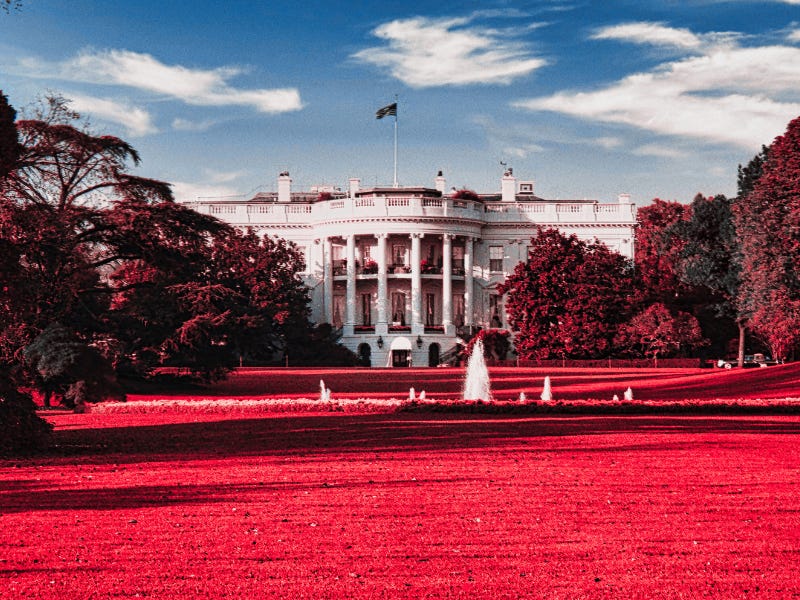Daydreams of an Economically Inconsequential Washington
Longing for some old-school Rick Perry.
Way back in 2011, when a group of Republican candidates were vying for their party’s presidential nomination to take on incumbent Barack Obama, then Texas Governor Rick Perry said something that stuck with me: “I promise you this. I will work every day to try to make Washington, D.C. as inconsequential in your life as I can.”
As a small-government conservative, the message hit the right note for me. I’m sure it did with many Republicans at the time, being that it echoed mainstream sentiment within the party, especially in the face of a Democratic administration using a financial crisis to restructure the U.S. health insurance market (while impeding our economic recovery with over-regulation).
A number of rather memorable rhetorical missteps ultimately derailed Perry’s candidacy, so I may be one of just a handful of people who still recalls his line about D.C. Still, I think it holds particular meaning in the year 2025, because it illustrates just how much the GOP and its leadership has changed in a relatively short period of time.
Back then it was an attractive party-premise to make Washington “inconsequential” in our everyday lives, but now, the leader of the Republican party (and president of the United States) is working hard every day to make himself as consequential in our livelihoods as one man can.
No, I’m not just talking about the grandstanding and other theatrics. Sure, Trump wants to be the center of attention, he enjoys going on television, and he loves occupying millions of people’s thoughts. That’s nothing new. Neither is his thirst for intimidating others into getting what things he wants. Sometimes that intimidation comes in the form of barriers — hurdles and headaches he creates for people and processes that only he can remove… typically in exchange for something.
Sometimes all he wants is flattery or groveling. Other times he’s looking for leverage, like the political dirt he tried to extort from Volodymyr Zelenskyy during the “perfect phone call.” Perhaps most often, the endgame is loyalty — personal and political, and typically at the expense of one’s morals, principles, and dignity. Sometimes that loyalty even requires violating the U.S. Constitution and rule of law.
What we’ve seen during Trump’s second term in office is an enormous escalation of barriers — executive-powered impediments to all kinds of things, including due process, freedom of speech, and foreign aid. But the one that stands out above all — the one most immediately consequential for the largest number of Americans — also happens to be the one Trump seems to have no coherent (nor even consistent) rationale for, even as a bargaining chip: his trade war.
I’ve said before that this entire escapade comes down to him just liking tariffs, and I still think that’s the driving force behind it all. But more broadly, as I alluded to earlier, I think he takes genuine pleasure in using his executive power to make others squirm and beg for leniency.
A lot of Trump supporters assuredly like such power-play optics, but most Americans are neither amused by them, nor see how they’re strengthening our nation.
The majority, in this case, is correct. Trump’s trade war has been an unmitigated disaster, and those still defending it are doing the nation a terrible disservice.
This central-planning crusade has caused global economic chaos, destroyed trillions of dollars in wealth, driven companies out of business, caused big U.S. manufacturing layoffs, increased the interest on our already skyrocketing debt, weakened the U.S. dollar, discouraged U.S. investment, driven consumer prices even higher, and needlessly antagonized virtually every one of our allies. And the only thing we have to show for it so far is an estimated $12 billion in extra, annual tax revenue (amounting to roughly four days of U.S. military spending), shallow promises of more U.S. manufacturing jobs (there are already half a million open ones that no one’s applying for), and rhetorical assurances of wondrous “deals.”
Meanwhile, of the 11 times in history that the Dow Jones has dropped below 1,000 points in a single day, four have happened since “Liberation Day.” And as of the time I’m writing this, the Dow is on pace for its worst April since 1932, while CEOs trample over each other to plead for carve-outs, and major financial institutions continue to predict a recession.
I would have to imagine, at some point, that Trump will get some kind of concession out of somebody (maybe China), and declare victory to try and save face, but there will be no serious argument to be made that this global trade war Trump unilaterally started will have been a net-positive for America. And most likely, our country will be digging ourselves out of this epic blunder for years to come.
This not only the result of one man’s ego and misguided fascination with tariffs, but also that of a U.S. Congress that is abdicating its responsibility to take back its constitutionally designated tariff power from the executive branch. It can’t be overstated that members of Congress could end this chaos tomorrow, and bring back some economic order, just by doing their jobs.
Until that happens, or until Trump throws in the towel on all of this nonsense, our country’s economic decline will only continue.
Boy, could we use a little Rick Perry nostalgia now.




What worked 100 years ago is NOT applicable to 2025. Only things that don't change would be how the human mind thinks and reacts, given a set of circumstances. Morals and manners wax and wane, but let's pray good 'common sense' prevails.
I am fortunate to have a few things (articles and letters) written by my PhD mechanical engineer great grandfather. Based on what he wrote about over 100 years ago, our making Washington, D.C. less consequential is highly unlikely to happen.